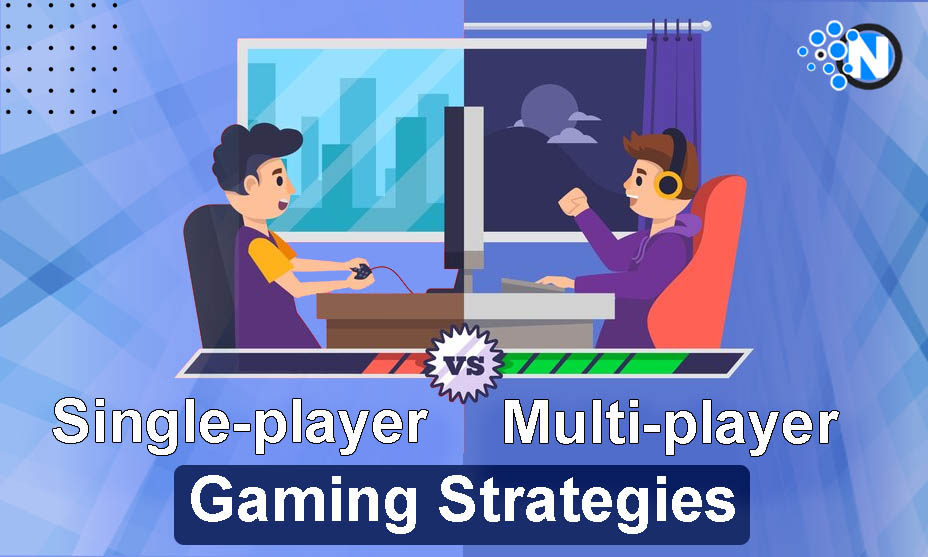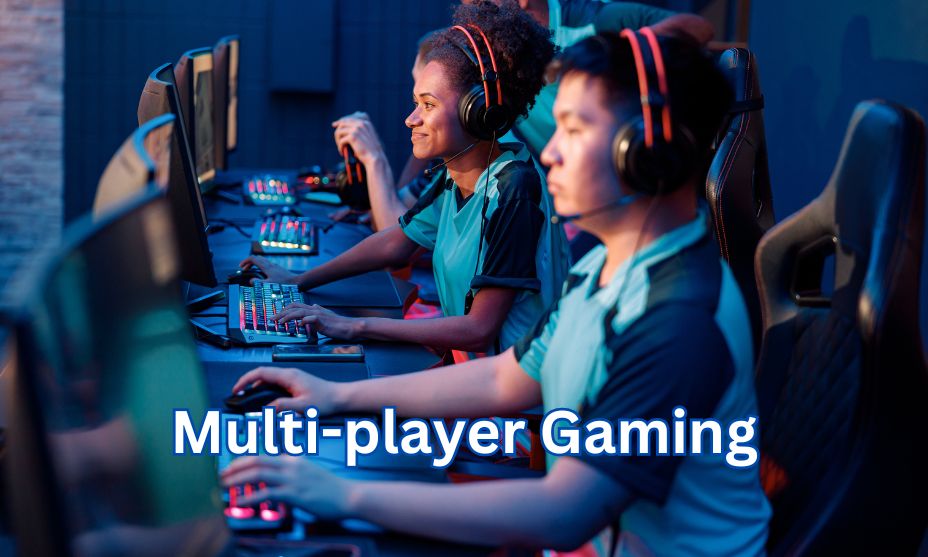Single-Player Vs Multi-Player Gaming Strategies

The difference between single-player and multi-player video games is obvious at the start glance, but it’s miles a piece greater complex than the number of players. Single-player games need to have a stronger storyline and gameplay elements than multi-player games because gamers don’t have other persons to have collaborate with. On the other hand, multi-player video games are first-rate whilst they’re centered on motion and collaboration in place of heavy story and RPG elements. There are some exceptions, of course, you may count on single-player video games to have a bit greater depth and lore
Because they are created differently and with different goals in mind, playing strategies differ between multi-player and single-player titles. Let’s take a look at some of the playing strategies you might find helpful as you play.
Single-player Gaming:
Single-player gaming strategies are often designed to slow down the game. Instead of rushing toward defeating a big boss, players are invited to enjoy the journey as much as the ending. If the game is story-driven, users might consider keeping a notebook of lore as they discover new bits of information. In titles where first-person combat reigns supreme, keeping notes of victories and losses and paying particular attention to choices and combat strategies can make the process more engaging and fun.
The Art of Solo Play
Single-player games are those where you take on the digital world all by yourself. They offer a unique gaming experience, often filled with rich narratives and immersive environments. But what strategies should you employ in these solitary adventures?
Challenges in Single-Player Games
However, solo gaming is not without its challenges. The absence of real opponents can lead to complacency, and the burden of decision-making rests solely on your shoulders. These challenges can be overcome with the right strategies.
Developing a Winning Mindset
You should look at each game as a chance to improve your skills. Fix your flaws, hone your abilities, and celebrate your development. Self-improvement is the true goal of solo play.
Tips for Efficient Resource Management
In games where resources matter, be frugal and strategic. Allocate resources wisely to ensure you have what you need when the going gets tough. Just like in life, resource management is key to success.
Effective Time Management for Solo Games
Managing your time wisely is crucial. Allocate enough time to play, but remember to balance it with other aspects of your life. A successful gamer doesn’t neglect their real-world responsibilities.
Multi-player Gaming:

The most important thing that players can remember in multi-player games is the importance of effective collaboration. Every player on your ‘team’ should have their own role and objectives to help the broader team succeed. In a collaborative game, such as World of Warcraft, players have their own specialties, strengths, weaknesses, and abilities. They must band together in order to defeat ancient evils as well as other players. The best gaming strategy in multi-player games is to ensure that the line of communication between users remains open. Players shouldn’t be afraid to speak up if something bothers them about the team or if they have an idea.
Single-player games come in various genres, from action-adventure to role-playing games. Each genre demands different strategies.
Different Types of Single-Player Game Genres
Explore the diverse world of single-player games, from intense survival horrors to tranquil farming simulations. Each genre has its unique challenges, so adapt your strategy accordingly.
Tailored Strategies for Each Genre
For instance, in a stealth-based game, patience and observation are your allies, while in a fast-paced shooter, reflexes and quick thinking are essential. Know the genre, and you’ll know the strategy.
Multi-player games offer a dynamic experience where you face real human opponents. The thrill of competition and social interaction sets them apart.
Social Aspects and Competition
Multi-player games bring people together, and the competitive element adds excitement. It’s a thrilling arena where you test your skills against others.
The Role of Strategy in Multiplayer Games
In multi-player gaming, it’s not just about reflexes; strategy plays a significant role. Knowing your strengths and weaknesses and adapting on the fly can be the difference between victory and defeat.
Multi-player gaming is a spectrum, ranging from cooperative to competitive gameplay. Each has its unique appeal and strategies.
Cooperative and Competitive Gaming
Cooperative gaming fosters teamwork and collaboration, while competitive gaming is about outwitting and outplaying opponents. Choose the style that suits your preferences.
In cooperative games, teamwork is everything. Effective communication and shared objectives lead to success. It’s like being part of a well-oiled machine.
Strategies for Competition
In competitive games, it’s all about outsmarting your rivals. Sharpen your reflexes, anticipate opponent moves, and stay one step ahead. Victory belongs to the strategist.
Communication is Key
In multiplayer gaming, communication is vital for coordinating with your team or taunting your opponents. Clear and concise communication can be the difference between a well-executed plan and chaos. Use in-game chat or voice communication to stay in sync. There are various tools and platforms to facilitate communication during gameplay. Discord, in-game voice chat, and even in-game pings help you convey your strategy and intentions. In multi-player gaming, you must strategize as a team. Establish callouts, communicate objectives, and provide feedback constructively. A team that communicates wins.
Card games
You might not know it, but card games are a popular game across the country, which is why we’re including a dedicated section to them. Many people in the US play card games in their downtime, including games such as poker and euchre. Both of these games are typically played with other people, while solitaire, as the name implies, is a popular game for individuals. Players will need different skills for different card games, especially if they are betting against other people. Advanced poker strategies can give you more information about the game and some lesser-known tips and tricks, for example, and the same is true in other card games.
Conclusion:
The choice between single-player and multiplayer modes in video games depends on more than just the number of players. Single-player games include deeper stories to make players enjoy the experience. Solo gaming success requires learning from failure, conserving resources, and maximizing playtime. However, multiplayer games succeed because people collaborate. Communication and strategy are key in cooperative and competitive team games. Playing card games competitively or alone is exciting and requires different skills. There’s a wonderful single-player or multiplayer game for you.
Are you interested in learning more about gaming? Whether you’re looking for a solo title or you prefer to play with friends, the chances are good that the perfect game is out there.




